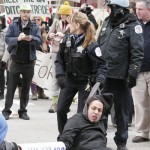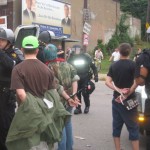In 1937, the Guild was founded on the principle to unite the lawyers, law students, legal workers and jailhouse lawyers to function as an effective force in the service of the people, to the end that human rights shall be regarded as more sacred than property interests.
- Interview with Lawrence Kennon, Civil Rights Atty
- Interview with Michael Deutsch, People’s Law Office
- Interview with Standish Willis, National Conference of Black Lawyers
- Interview with Jim Fennerty, Civil Rights Atty
The Early Years
In 1937 the National Lawyers Guild was the nation’s 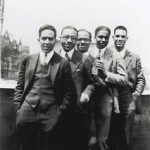 first racially integrated bar association. The first Guild lawyers supported President Roosevelt’s New Deal, assisted the emerging industrial labor movement, and opposed the racial segregation policies of the American Bar Association and the larger society. During its 80 year history, the NLG has been an important part of the American people’s struggle for real democracy, for economic and social justice, and against oppression and discrimination based on race, ethnicity, immigration status, class, gender or sexual orientation. Consistent with its commitment to ensuring fairness and equality for all people, law students, non-lawyer legal workers and inmate legal experts are full members. The Guild elected its first African-American president in the early 1950s and its first female president in the 1960s. The first legal worker president was elected in 1996.
first racially integrated bar association. The first Guild lawyers supported President Roosevelt’s New Deal, assisted the emerging industrial labor movement, and opposed the racial segregation policies of the American Bar Association and the larger society. During its 80 year history, the NLG has been an important part of the American people’s struggle for real democracy, for economic and social justice, and against oppression and discrimination based on race, ethnicity, immigration status, class, gender or sexual orientation. Consistent with its commitment to ensuring fairness and equality for all people, law students, non-lawyer legal workers and inmate legal experts are full members. The Guild elected its first African-American president in the early 1950s and its first female president in the 1960s. The first legal worker president was elected in 1996.
In the 1930s, NLG lawyers helped organize the United Auto Workers (UAW), the Congress of Industrial Organizations (CIO) and supported the New Deal in the face of determined ABA opposition. In the 1940s, Guild lawyers fought against fascists in the Spanish Civil War and WW II, and helped prosecute Nazis at Nuremburg. Guild lawyers fought racial discrimination in cases such as Hansberry v. Lee, the case that struck down segregationist Jim Crow laws in Chicago and entered our culture as Lorraine Hansberry’s “A Raisin in the Sun.” The Guild was one of the non-governmental organizations (NGOs) selected by the U.S. Government to officially represent the American people at the founding of the U.N. in 1945.
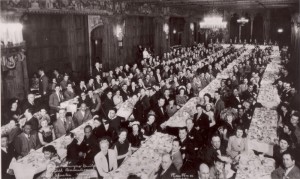
1948 Guild Convention in Chicago
In the late 1940s and 50s, Guild members founded the first national plaintiffs personal injury bar association that became the American Trial Lawyers Association (ATLA), and pioneered the storefront law offices for low-income clients that became the model for the community-based offices of the Legal Services Corporation. During the “McCarthy era,” Guild members represented the Hollywood Ten, the Rosenbergs, and thousands of victims of the anti-communist hysteria. Unlike all other national civil liberties groups and bar associations, the Guild refused to require “loyalty oaths” of its members and the NLG was unjustly labeled “subversive” by the government.The Justice Department admitted the charges were baseless after ten years of federal litigation.
Civil Rights and the Anti-War Movement
In the 1960s, the Guild set up offices in the South and organized thousands of volunteer lawyers and law students to provide legal support for the Civil Rights Movement long before the federal government was involved. Guild members represented the families of murdered civil rights activists 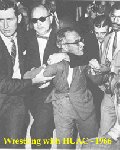 Schwerner, Chaney and Goodman, who were assassinated by local law enforcement members of the Ku Klux Klan. Guild-initiated lawsuits brought the Kennedy Justice Department directly into the Civil Rights struggle in Mississippi and challenged the seating of the all-white Mississippi delegation at the 1964 Democratic Convention. Guild lawyers defended thousands of civil rights activists who were arrested for exercising basic rights and established new federal constitutional protections in ground-breaking Supreme Court cases such as: Dombrowski v. Pfister, which enjoined thousands of racially-motivated state court criminal prosecutions; Goldberg v. Kelly, the case that established the concept of “entitlements” to social benefits which require Due Process protections; and, Monell v. Dept. of Public Services, which held municipalities liable for brutal police employees.
Schwerner, Chaney and Goodman, who were assassinated by local law enforcement members of the Ku Klux Klan. Guild-initiated lawsuits brought the Kennedy Justice Department directly into the Civil Rights struggle in Mississippi and challenged the seating of the all-white Mississippi delegation at the 1964 Democratic Convention. Guild lawyers defended thousands of civil rights activists who were arrested for exercising basic rights and established new federal constitutional protections in ground-breaking Supreme Court cases such as: Dombrowski v. Pfister, which enjoined thousands of racially-motivated state court criminal prosecutions; Goldberg v. Kelly, the case that established the concept of “entitlements” to social benefits which require Due Process protections; and, Monell v. Dept. of Public Services, which held municipalities liable for brutal police employees.
In the late 1960s and early 1970s, Guild members represented Vietnam War draft resisters, antiwar activists and the Chicago 7, after the 1968 Chicago Convention. NLG offices in Asia represented GIs who opposed the war. Guild members argued U.S. v. U.S. District Court, the Supreme Court case that established that Nixon could not ignore the Bill of Rights in the name of “national security” and led to the Watergate hearings and Nixon’s resignation. Guild members defended FBI-targeted members of the Black Panther Party, the American Indian Movement, the Puerto Rican independence movement and helped expose illegal F.B.I and C.I.A. surveillance, infiltration and disruption tactics (called COINTELPRO), that the U.S. Senate “Church Commission” hearings detailed in 1975-76 and which led to enactment of the Freedom of Information Act and other specific limitations on federal investigative power.
International Interests
The NLG supported self-determination for Palestine, opposed apartheid in South Africa, at a time when the U.S. Government still called Nelson Mandella a “terrorist” and began the fight against the blockade of Cuba. During this period, NLG members founded other important civil rights and human rights institutions, such as the Center Constitutional Rights, the National Conference of Black Lawyers, the Meiklejohn Civil Liberties Institute in Berkeley, San Francisco’s New College School of Law and the Peoples Law School in Los Angeles.
In the 1980s, the Guild pioneered the “necessity defense” and used international law in support of the anti-nuclear movement and began challenging the use nuclear weapons under international law. This eventually resulted in the World Court declaration that nuclear weapons violate international law in a case argued by Guild lawyers more than a decade later. The NLG National Immigration Project began working systematically on immigration issues, spurred by the need to represent Central American refugees and asylum activists fleeing U.S. sponsored “terror” Nicaragua and El Salvador. The Guild organized “People’s Tribunals” to expose the illegality of U.S. intervention in Central America that even more widely known as the “Iran-Contra” scandal. The Guild prevailed in a lawsuit against the F.B.I. for carrying out illegal political surveillance of legal, activist organizations, including the Guild.
Globalization and the 1990s
In the 1990s, Guild members mobilized opposition to the Gulf War, defended the rights of Haitian refugees escaping from a U.S.- sponsored dictatorship, opposed the U.S. embargo of Cuba and began to define a new civil rights agenda that includes the right to employment, education, housing and health care. Legal theories for holding foreign human rights violators accountable in U.S. courts based on early 19th Century statutes were pioneered by Guild lawyers. The Guild began developing an analysis of the impact of “globalization” on human rights and the environment several years before the Seattle demonstrations, and our members have played an active role opposing NAFTA and in facilitating and supporting the growing movement for “globalization of justice. As the 20th Century came to a close, the Guild was defending anti-globalization, environmental and labor rights activists from Seattle, to D.C., to L.A. Guild members were playing an active role in encouraging cross-border labor organizing and in exposing the abuses in the maquiladoras on the U.S.-Mexico Border. The NLG’s Project for Human, Economic and Environmental Defense (HEED) and the Committee on Corporations, the Constitution & Human Rights began working on “globalization” issues.
Today and Tomorrow
At the turn of the 21st Century, globalization of information and economic activity is a fact of life, but so is the globalization of extremes in wealth and poverty. Guild members have long recognized that neither democracy nor social justice is possible, internationally or domestically, in the face of vast disparities in individual and social wealth. In short, we have always seen questions of economic and social class as inextricably intertwined with most domestic and international justice issues. Domestically, the betrayal of democracy and the Supreme Court’s integrity in Bush v. Gore has made clear that the struggle for real democracy in the U.S. is far from over. The intertwining of governmental power with the influence of corporations, epitomized by the ENRON debacle, has confirmed fighting corporate power will be a major challenge for the American people in the new century. The seizure of governmental power, the huge buildup of military might and the attack on civil liberties after the 9-11 tragedy, together with the scapegoating of Muslims, Middle-Eastern immigrants and the re-creation of McCarthyesque “anti-terrorism” measures, has demonstrated that the Guild must, once again, play the role for which history and experience has prepared its members.
Guild members lobbied Congress and worked with the House Judiciary Committee in a failing effort to turn back the worst aspects of the 2001 USA PATRIOT Act. Guild members filed the first challenges to the detention of prisoners from Afghanistan and to the use of military tribunals. Across the nation, Guild members are demanding that civil liberties be protected and that the U.S. Government respect the Constitution and international law at home and abroad. Guild members are defending activists, representing immigrants facing deportation, testifying in federal and state legislatures against civil liberties cutbacks. They are using their experience and professional skills to help build the 21st Century grassroots movements that will be necessary to protect civil liberties and to defend democracy now and in the future.
Professor Peter Erlinder
Past-President, National Lawyers Guild (1993-97)
